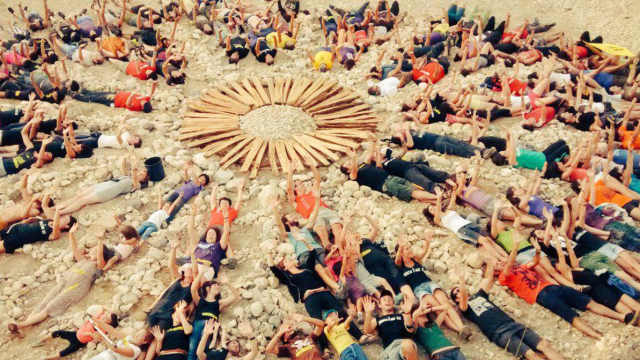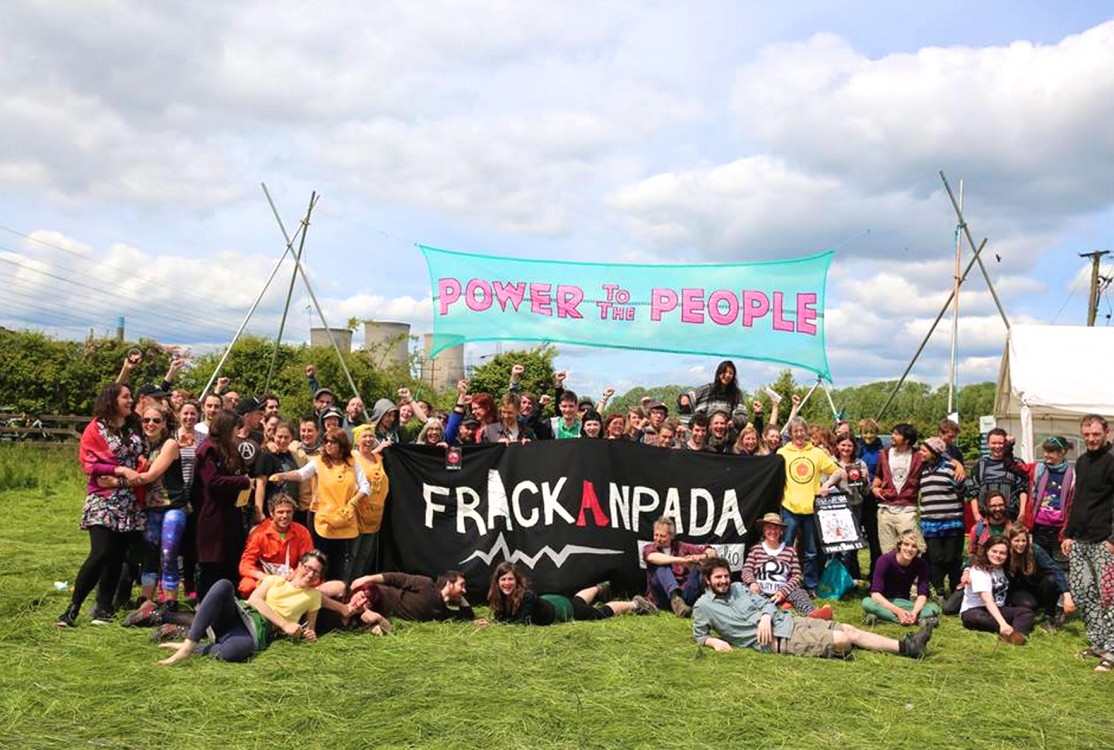
“This is the first time fracking activists have got together on this scale internationally – it has been incredible to meet people from struggles across the world, activists from Kurdistan to Brazil, from Ukraine to Portugal and Algeria," says Catriona, from Ireland, who attended Frackanpada held earlier this month in the Basque Country of Spain.
Communities across both the Irish Republic and Northern Ireland are actively resisting efforts to frack for oil, Catriona said. But what this event showed her is that "it is a truly international [fight], united in our common struggle.”
At Frackanpada, the world's first international anti-fracking camp that took place in mid-July, hundreds of activists from across the globe joined skill shares, attended panel discussions and watched documentaries dedicated to strategies and campaigns in resistance to fracking.
Located on the fringe between the Pyrenees Mountains and the agricultural plain of northern Spain, the camp was situated on common land, owned by the village of Subijana de Alava just outside Vitoria-Gasteiz, some 50 miles south of Bilbao.
In the late 1990s, conventional drilling was attempted near the village but the gas pressure was too low to make it economically viable. In the early 2000s, the site was earmarked for fracking – but the extractive process has recently been stopped throughout the Basque country, making the place a potent symbol for resistance.
The fact that land was once intended for fracking has just played host to the broadest international gathering to date to resist fracking is a telling sign about the movement's global victories in recent years. Fracking in now on hold in the UK and banned in France. Companies are pulling out their fracking operations, like Chevron withdrawing from Eastern Europe. And in Spain, the Basques have done perhaps more than anyone else to send frackers packing.
“In the Basque Country what we have is even better than a ban, even though our Parliament does not have the jurisdiction to do this," Mikel Otero of the group Fracking EZ, which organized the camp, tells me. "No fracking can go ahead due to three laws – a triple filter – passed through the Basque Parliament that all make fracking impossible."
Organized and Powerful
The power and influence of the anti-fracking movement in the Basque region is obvious, where towns and villages are covered with Fracking Ez (No Fracking) flags. Otero explains how the movement used every avenue available to them to create broad public opposition to the drilling process – from diverse activist tactics to working with the Basque Parliament and at local municipality levels.
"The campaign has focused on carefully explaining the technical and scientific details to local people through hundreds of meetings everywhere, including the smallest villages," he says, "so locals are the reference for fracking: it means when the industry come to sell the idea of fracking, everyone is warned.”
The Frackanpada camp, which served as an autonomous temporary community, also showcased energy alternatives like solar ovens and solar water heaters. Organized by activists from the Basque country and across Spain, a core aim of the camp was to bring together an international anti-fracking movement that can organize resistance and drive policy not only here, but across Europe.
“This camp has given us the opportunity to come and meet face to face and talk about the different tactics [we use], to find common ground to fight together but still in [our] own ways,” says Estaban Domenech of the Plataforma Antifracking Comarques de Castello.
A remarkable translation system was used to facilitate the trainings, with all of the sessions, meetings and assemblies held in Basque, Spanish, English or other languages, and immediate translation transmitted via FM radios and earphones.
But the ethos of the camp, while internationalist, was firmly grounded in Basque culture. I ask Mikel Otero about the relationship between the Basque Independence and anti-fracking movements.
“It is not an easy question," he says. "The anti-fracking movement transcends some topics. For instance, we say, 'Fracking ez hemen, ez inon,' [No fracking here, not anywhere] as the fracking battle is both our land and what happens everywhere else in the world.”
Toxic chemicals know no borders, he adds, and neither should the anti-fracking movement.
“Of course we know that we have the [Basque] language and culture and a lot of people are tied to our movement for independence, so we are in dialogue and respect these struggles," he says. "I think it’s a balance to remember the geological and global connections, while remembering where we are and our local struggles.”
The collaboration happening across Spain mirrors, in fact, the way the anti-fracking movement has been growing in recent years across borders.
“When I joined the anti-fracking struggle three years ago, I never would have imagined the movement would grow as massively as this camp,” says María Olteanu from the Romanian anti-fracking organization Sustainable Local and Autonomous Energy Transition (TESLA).
“This is a major step in the global fight against fracking, which I feel positive we are winning. There are plenty of us all over the planet, we are young – and I don’t mean in body, but young in mind," she says. "We won’t allow the few to destroy the world. We will reclaim the power.
3 WAYS TO SHOW YOUR SUPPORT
- Log in to post comments












